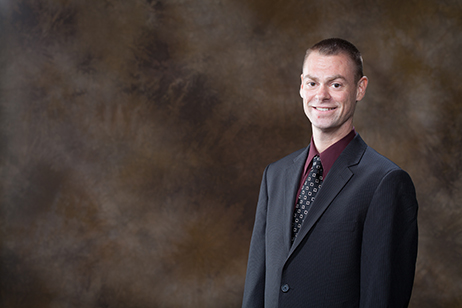McDermott Provides Expertise for AETN Film on Heat Illness
FAYETTEVILLE, Ark. – In a few weeks, football players in Arkansas from junior high through college will get down to the serious business of preparing for the fall season. It’s likely to be very hot.
Brendon McDermott, University of Arkansas assistant professor of exercise science, studies heat and hydration issues and works with athletes, coaches, athletic trainers, emergency medical technicians, other medical professionals and parents to educate them about the ways to avoid exertional heat illness – and possible death – while exercising in the heat. McDermott, who is also a certified athletic trainer, is featured in an hourlong documentary about the dangers of exertional heat illness produced by the Arkansas Educational Television Network that will air at 7 p.m. Monday, July 21 on AETN.
A live event with a panel discussion and phone bank will follow the statewide broadcast, titled “108 Degrees: Critical Response.” Information in the film applies to other sports and exercise, in addition to football.
In the film, McDermott describes the physiology of heat illness, the conditions that lead to it, how the body reacts when stricken, and what coaches, EMTs, athletic trainers and parents need to know to prevent and treat it. Dean Weber, who formerly supervised the athletic training operations for Razorback men’s sports teams for 35 years, is also interviewed in the program.
McDermott and Weber will both be on the panel following the film in the AETN studios in Conway.
In June, McDermott was in Indianapolis to help the National Athletic Trainers’ Association announce new guidelines designed to prevent exertional heat illness. Exertional heat stroke is one of three leading causes of sudden death in sport, according to the report, but the illness is largely preventable when strategies are in place such as acclimating the body to the heat gradually, staying hydrated and modifying exercise based on environmental conditions.
The guidelines are based on the type of research that McDermott does at the University of Arkansas and they cover the same issues described in the AETN film:
- Schedule practices beginning with shorter time periods and without wearing full gear so that players get used to the heat gradually, referred to as acclimatization in the report.
- Have a cold water immersion tub and towels soaked in ice water on the sidelines of practices and games to immediately cool an athlete suspected to be suffering from heat stroke.
- Don’t take the athlete to a medical facility until his or her temperature has been lowered through the use of the cold water immersion.
The guidelines from the National Athletic Trainers’ Association put greater emphasis than previous guidelines issued in 2002 on, first, cooling a patient with exertional heat stroke and transporting the patient to a medical facility second, McDermott said.
“There is no longer an alternate recommendation for cooling,” he said. “The recommendation is for using cold water immersion and no longer includes using ice bags on major arteries as a potential alternative.”
McDermott said the National Athletic Trainers’ Association also changed the guidelines to recommend that athletic trainers tailor their heat-acclimatization policies to their geographic region, rather than using the same cut points for practice alterations in Minnesota and Louisiana, for example.
Joey Walters, deputy executive director of the Arkansas Activities Association that governs school-sponsored sports in Arkansas, said in the film that every school in Arkansas that offers sports is required to have an emergency action plan in place. The activities association provides a sample athletic health-care planning guide for schools to use and sets rules about preseason practices that follow the recommendations of the Korey Stringer Institute, a research and advocacy institute based at the University of Connecticut whose goal is to prevent sudden death and illness in sports.
McDermott serves on the Medical and Science Advisory Board of the Korey Stringer Institute. He said the rules for preseason football in Arkansas are some of the best in the country.
“We were the second state to adopt the Stringer Institute-approved guidelines,” McDermott said. “We have it good. However, many neighboring states do not have good guidelines.”
Amy Waller, one of the producers of the film, said it was produced as part of a professional development training series in accordance with a state law passed in 2011 requiring coaches to complete training every three years on heat illness, concussion and communicable disease. Coaches can watch the film and take a test to meet the requirement for training on heat illness, Waller said.
McDermott teaches in the graduate athletic training program in the College of Education and Health Professions. He coordinates the clinical aspect of the program, making sure that students gain hands-on experience in a variety of settings in Northwest Arkansas, from collegiate sports to physicians’ offices.
Contacts
Brendon McDermott, assistant professor of exercise science
College of Education and Health Professions
479-575-4670, brendonm@uark.edu
Heidi Wells, content writer and strategist
Global Campus
479-879-8760,
heidiw@uark.edu
